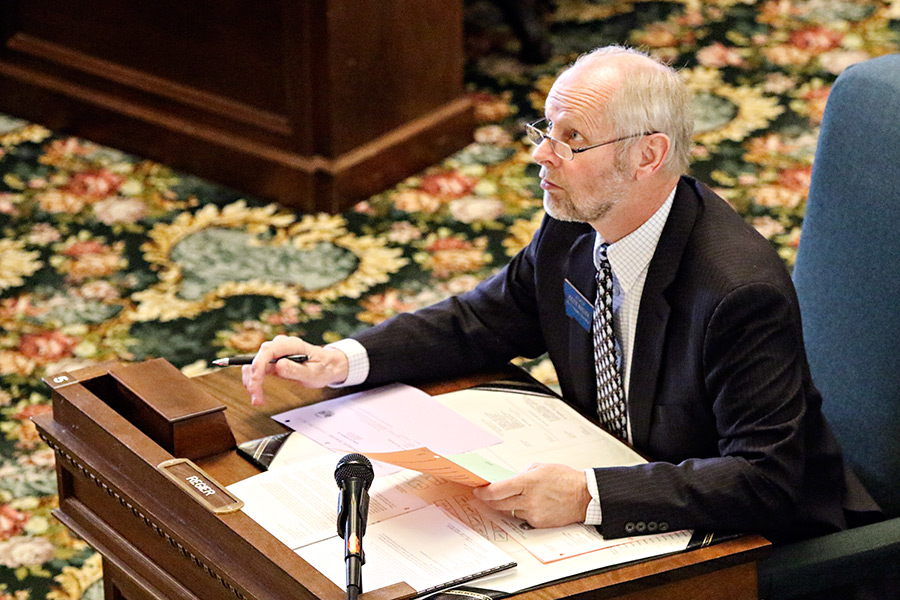Kalispell Lawmaker Urges Congress to ‘Investigate Alternatives’ to Tribal Reservation System
CSKT member says his legislative colleagues need “a very basic history lesson,” pledges to introduce bill requiring Indian Education for All for legislators
By Tristan Scott
A Kalispell lawmaker’s resolution urging Congress to “investigate alternatives to the American Indian Reservation System” is being met with derision by members of the Montana Legislature’s American Indian Caucus, prompting one member of the Confederated Salish and Kootenai Tribes (CSKT) to offer to give his colleagues a history lesson.
“I keep saying it over and over that a lot of people in the Montana Legislature could benefit from some very basic civics lessons about our state’s history,” Sen. Shane Morigeau, D-Ronan, told the Beacon. “Sadly, this is what happens when you don’t have Indian Education for All for our legislators.”
Morigeau’s remarks were in response to a measure by Sen. Keith Regier, R-Kalispell, a retired teacher and longtime state lawmaker who on Jan. 2 introduced a joint resolution aimed at investigating a system that has “produced the negative effects of drug abuse, alcoholism, domestic violence, welfare dependence, poverty, and substandard educational achievements, resulting in lack of opportunity for their future well-being and happiness,” according to the resolution, LC 1964.
Regier did not respond to multiple requests for comment via email and telephone in time for this article’s online publication.
There are 12 American Indian tribes in Montana that are recognized as sovereign nations by the U.S. and about 78,000 people of American Indian heritage living in Montana, or 6.6% of the state’s total population; most of them reside on one of the state’s seven reservations.
Morigeau grew up in Ronan, a largely white community on the Flathead Indian Reservation, and said he’s accustomed to encountering misunderstanding about Native American history and culture.
“Where I grew up, we are a minority on our own reservation because of the policies surrounding assimilation, allotment and the Termination Era that caused a lot of damage,” Morigeau said. “I grew up with people having these microaggressions toward me, because they grew up with those stereotypes and misunderstandings in their mind. I was taught by people to hate who I am, and that has empowered me to do a better job representing our cultural history. Many of our Indian reservations predate the state of Montana.”
Jonathan Windy Boy, D-Box Elder, said some members of Montana’s Republican Party have been working to erode tribal sovereignty for years, pointing to the state GOP’s efforts in 2016 to reword its party platform surrounding the recognition of tribes as sovereign nations.
“The Republican Party removed that recognition from their platform because they don’t want to recognize us as members of sovereign tribal nations,” Windy Boy said.
According to Morigeau, Regier’s resolution is just one of a host of measures aimed at chipping away at tribal rights that have emerged in the opening days of the 68th Montana Legislature. As an example, he pointed to a draft bill request by Rep. Joe Read, R-Ronan, that seeks to establish hunting seasons on fee land within the Flathead Indian Reservation, as well as continued opposition to the CSKT-Montana Water Compact.
“We gave up millions of acres of land and millions of people benefit from that land today,” Morigeau said. “There’s a lot of entitlement that exists due to a fundamental misunderstanding of history. So instead of trying to be hurtful and get in the paper for having extremist resolutions, let’s require Indian Education for All – and let’s require it for all our legislators.”
He continued: “If you understand the history even a little bit and why the federal government went ahead and established this system, it’s pretty basic. And that general lack of understanding is one of the reasons that Indian Education for All is critical for Montana. People have a short memory,” Morigeau said. “For us, it’s just frustrating because we have to expend energy responding to something that’s completely ridiculous. It’s just a mean-spirited PR stunt. Anybody who drops something like this resolution knows it’s going to get coverage. It propagates stereotypes and makes our work to dispel those stereotypes even harder. It just takes us so far off course.”
In 2016, the Montana Legislative Services Division updated its legislative handbook, “The Tribal Nations of Montana: A Handbook for Legislators,” which prior to that hadn’t been changed since 1995.
“We still have the handbook, but I really doubt anyone reads it,” Morigeau said, adding that he intends to bring a bill forward requiring an Indian Education for All program for state lawmakers.